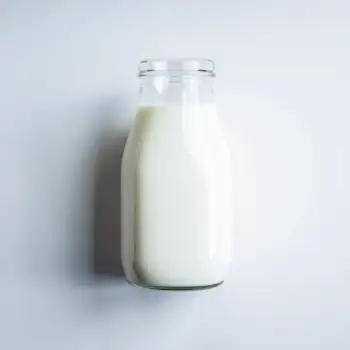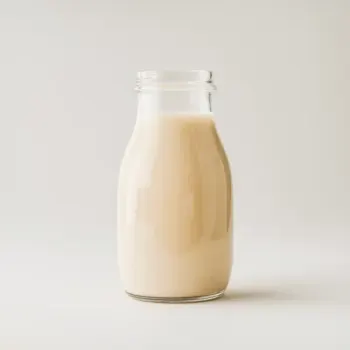"Milk vs Oat Milk" compares dairy milk and oat milk for cooking, highlighting differences in taste, texture, nutritional content, and how each performs in baking, coffee, and sauces. Milk offers richness and protein, while oat milk provides a sweet, vegan alternative.

Milk, a nutrient-rich liquid produced by mammals, is a kitchen staple loaded with proteins, vitamins, and minerals. Its versatility makes it a mainstay in various recipes, from baked goods to savory sauces.

Oat Milk is a plant-based alternative to dairy, made by blending oats with water and straining the mixture. It's known for its creamy texture and slightly sweet flavor, as well as being a favorite among vegans and those with lactose intolerance.
Milk and Oat Milk differ in taste, texture, and nutritional profile. Milk has a rich, creamy taste and is high in protein and calcium. Oat Milk is naturally sweeter, lower in protein, but often enriched with nutrients. Their textures also differ: Milk is naturally smooth, whereas Oat Milk can be more viscous.

Your ultimate Recipe Box, Meal Planner, and Cooking Class all in one
In baking, milk contributes to the structure and tenderness of the final product. It's ideal for cakes, pastries, and bread. Expect a soft crumb and a slight richness from the milk fats. Oat Milk can be used in vegan baking, adding moisture to cakes and muffins. It imparts a mild sweetness and can create denser, moister baked goods. When using Oat Milk, consider the additional sweetness it may bring.
In coffee and tea, milk adds creaminess and balances the bitterness. It froths well for lattes and cappuccinos, resulting in a smooth, velvety texture. Oat Milk is a popular dairy-free option for coffee and tea, known for its ability to froth and create a creamy texture similar to milk. It adds a slight oat flavor which some may prefer.
Milk is a classic base for creamy sauces and soups, providing a rich and smooth texture. It's perfect for béchamel sauce, chowders, and creamy bisques. Oat Milk can be a dairy-free alternative for creamy sauces and soups, offering a similar texture with a slightly sweet undertone. It works well in vegan recipes or for those looking to reduce dairy intake.
Milk is a natural source of high-quality protein and calcium. Oat Milk is lower in protein but often fortified with vitamins and minerals.
| Nutrient | Milk ( per Cup ) | Oat Milk ( per Cup ) |
|---|---|---|
| Fat | 8g | 5g |
| Sodium | 105mg | 100mg |
| Calcium | 276mg | 350mg (fortified) |
| Protein | 7.7g | 3g |
| Calories | 149 | 120 |
| Carbohydrates | 11.7g | 16g |
Health benefits depend on individual dietary needs. Oat Milk is lower in protein and fat, but often fortified with vitamins and minerals. It's also dairy-free and lactose-free, making it suitable for vegans and those with lactose intolerance.
Oat Milk can be used as a substitute in most recipes, especially in baking and cooking. However, the difference in sweetness and protein content may affect the final outcome of the dish.
While Oat Milk aims to mimic the creaminess of milk, it has a distinct, slightly sweet oat flavor that sets it apart from dairy milk.
Yes, Oat Milk froths well and is a popular choice for lattes and cappuccinos, especially for those seeking a dairy-free alternative.
Oat Milk is a great option for baking, particularly for vegan or dairy-free recipes. It adds moisture and a hint of sweetness to baked goods.